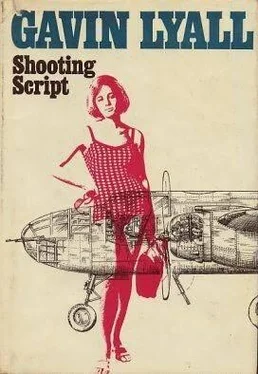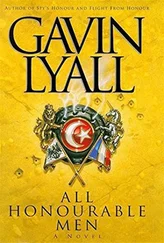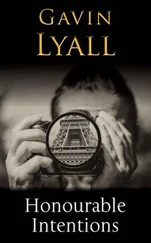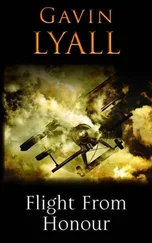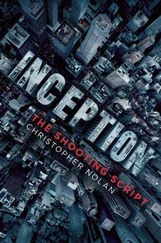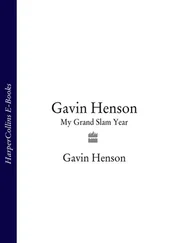Gavin Lyall - Shooting Script
Здесь есть возможность читать онлайн «Gavin Lyall - Shooting Script» весь текст электронной книги совершенно бесплатно (целиком полную версию без сокращений). В некоторых случаях можно слушать аудио, скачать через торрент в формате fb2 и присутствует краткое содержание. Жанр: Триллер, на английском языке. Описание произведения, (предисловие) а так же отзывы посетителей доступны на портале библиотеки ЛибКат.
- Название:Shooting Script
- Автор:
- Жанр:
- Год:неизвестен
- ISBN:нет данных
- Рейтинг книги:3 / 5. Голосов: 1
-
Избранное:Добавить в избранное
- Отзывы:
-
Ваша оценка:
- 60
- 1
- 2
- 3
- 4
- 5
Shooting Script: краткое содержание, описание и аннотация
Предлагаем к чтению аннотацию, описание, краткое содержание или предисловие (зависит от того, что написал сам автор книги «Shooting Script»). Если вы не нашли необходимую информацию о книге — напишите в комментариях, мы постараемся отыскать её.
Shooting Script — читать онлайн бесплатно полную книгу (весь текст) целиком
Ниже представлен текст книги, разбитый по страницам. Система сохранения места последней прочитанной страницы, позволяет с удобством читать онлайн бесплатно книгу «Shooting Script», без необходимости каждый раз заново искать на чём Вы остановились. Поставьте закладку, и сможете в любой момент перейти на страницу, на которой закончили чтение.
Интервал:
Закладка:
Then I fired them, handed over a wad of Whitmore's dollars, and let them find their own way back to Palisadoes. When they were out of sight, I took out my torch and ducked down for a private look around the bay itself.
Standing on the ground, I was inside it from about my hips up: a hot, dark metal box full of old oily grime and petrolfumes. About eight feet lengthways nearly four wide, and six high. And the first quick flash of the torch convinced me the attack was off: the roof of the bay was quite bare.
I ducked out for a breath of air and a reconsideration. To be quite honest, as an ex-fighter pilot I couldn't remember ever having seen a bomb rail or shackle before; they were just words I'd picked up. But I was quite certain the roof of that bay didn't have any, and just as certain that anything that'll hold a 500-pound bomb can't be knocked up in a dull evening with a cigar box and a couple of rusty hairpins.
And it isn't something you put a 'wanted' ad in the Daily Gleaner for, either.
I took a deep breath and ducked in again just to make sure.
The roof of the bay was still empty. But when I turned the torch on the sides, they were lined with heavy metal stringers that seemed far too strong just to support the thin metal of the box – it wasn't even the outside skin of the aeroplane itself. And spaced along them, two to each side, were four thin, irregular-shaped steel boxes. I stared at them in the torchlight. They were just over a foot long,"with two flat hooks sticking down at either end.
I dipped a finger in a pool of petrol on the tarmac beneath and rubbed it over one of the boxes. And I knew the attack was on again.
Surprisingly clear and non-rusty under the grime, the lettering came up: Bomb Shackle Mk, S.
'You know, they must've hung the bombs on thesides of the bay, one above the other, and let 'em roll out and down?' I said. 'I suppose I should have guessed: you wouldn't need a bay six foot high if you were just going to hang 'em from the roof, and I suppose it must've worked – as long as you pressed the buttons in the right order – but still-'
'Will it work now?' Whitmore asked.
He and Luiz had been waiting for me on die Boscobel strip when I flew the Mitchell in soon after five. Apparently J.B. was off visiting a sick contract and Miss Jiminez had decided, after all, that she'd better go and watch Diego's coffin being shoved aboard a Venezuelan freight plane.
'With a lot of work,' I said slowly. I held up the shackle I'd managed to get off the rail. 'The shackles are in pretty good condition – I suppose because the thing was being used as a bomber in Colombia up to a couple of years back. You get the shackles off the rails, hook on the bombs – two hooks, you wouldn't want a bomb waggling around on just one – winch the whole lot up, fit the shackle back on to the rail. Then these' -1 tapped a couple of little levers sticking out of the top of the shackle – 'fitted into some sort of release gear.
"The trouble is,' I went on, 'that all that gear's gone. It must've worked on electro-magnets, with a coil in the circuit to step up the power, and probably the whole thing duplicated to avoid hang-ups. And on top ofthat, a fusing circuit – you wouldn't take off with the bombs fused and there's no way of getting at them from inside the plane.'
Whitmore nodded, reached out, and pushed the hooks closed. Then slapped the trip levers with a huge finger. The hooks came open with a vicious littleclack.
It was a cold shivery sound in the hot sun. Whitmore looked at Luiz and grinned slowly. 'Sounds simple enough.'
'Simple?' I stared at him.
'Hell, fella – one thing afilm unit's got is electricians. We got 'em like that guy in The book had pimples.'
'Job,' Luiz said. 'And boils.'
Whitmore jerked his head. 'He played a Bible picture once. Anyhow, I'll get the boys down to work on her tomorrow. Hell, she's in the script – so why can't she drop a few bombs? Rig some dummies outa beer cans or something. Have 'em going off along the river, bang-bang-bang; use dummy charges. We got a scene there.'
He walked off to look at my jeep.
Luiz sighed. 'Another scene where I get my feet wet.'
I grinned, then asked: 'Can they really do it?'
'My friend – you recall we are already building a fifty-foot church for this picture? A little matter like arranging a bomb-release circuit… They will do it.'
Whitmore walked back. 'That your jeep, fella?'
I'd said 'yes' before I realised my mistake. They needed an old, battered jeep for the scene outside the church. Of course.
The next morning, the boys moved in. They were either good electricians or good actors; either way, they knew more about what they were doing than I did. So I just suggested where they could mount the release buttons – over some of the empty sockets at the top of the instrument panel – and left them to get on with it.
The art director had also arrived, without his crocodile jacket, but with a couple of scene-painters to help give the Mitchell a little movie make-up. This consisted of spraying her silver, shoving a couple of painted broomsticks in the nose and tail positions to look like machine guns, and inventing Amazonian Air Force insignia for her wings and sides. I tried to help on this last one by pointing out that every combination of shapes and colours they dreamed up had already been used by a real South American country.
Finally the art director told me they'd use a mixture of Malayan and Congolese symbols – a completelydarling yellow star on a totallyravishing square of ultramarine (he was going to redecorate his bathroom inexactly the same colours just assoon as he got home) – and meantime would Ipleasego away?
So I checked up on the weather – a maximum of 15 knots from 70 degrees, with a slightly suspicious circular disturbance north of Barbados – then went away to die Golden Head Tavern, just up the road.
At that time of day, the little bar was quiet, almost empty. The only other customer was sitting up at the bar, his back to me.
I went up and ordered a Red Stripe. The customer said quietly: 'Can I buy you that one?'
A knobbly, tanned face, cropped greying hair, milky-coffee-coloured suit. It took a moment to place him, he was so far out of place.
Then I had it. 'Agent Ellis, I believe? Aren't you on CIA territory?'
He smiled easily. 'I'm on holiday. But you know – the Bureau once had a sort of responsibility out this way. The Caribbean, South America. Counterespionage, in the war. Before they invented the CIA.'
FBI small talk again.
My beer arrived and I said: 'Here's to yourholiday. Hope you don't get troubled by work.'
'No trouble.' He drank. 'Heard I might find you here, these days. Remembered I'd promised you something.' He felt in a side pocket and handed over a small rectangle of brass.
On it, engraved in neat capitals, wasit'd screw me up all over the caribbean. Then I remembered the phrase, back in the bar of the Sheraton at San Juan.
I grinned, turning the plate in my hands. A small hole at each corner, ready to be pinned to an instrument panel. And a lot neater than any of the notices I'd met pinned to panels in any aeroplane before. It was a professional job and it must have cost him money.
'Why the hell did you do this?' I asked.
He looked down at his glass and frowned thoughtfully. 'You're a trained fighting man, Carr. You did a good job in Korea and I happen to think that's important. But it isn't a very saleable talent. Well, we taught it you – so maybe we owe you something.' He nodded at the plate. 'That, anyway.'
'You're wrong, of course,' I said softly. 'A good fighter pilot's never working for anybody but himself.'
'Maybe. You still did a good job. And I diink that about covers it. Unless it's too late, of course.'
Читать дальшеИнтервал:
Закладка:
Похожие книги на «Shooting Script»
Представляем Вашему вниманию похожие книги на «Shooting Script» списком для выбора. Мы отобрали схожую по названию и смыслу литературу в надежде предоставить читателям больше вариантов отыскать новые, интересные, ещё непрочитанные произведения.
Обсуждение, отзывы о книге «Shooting Script» и просто собственные мнения читателей. Оставьте ваши комментарии, напишите, что Вы думаете о произведении, его смысле или главных героях. Укажите что конкретно понравилось, а что нет, и почему Вы так считаете.
